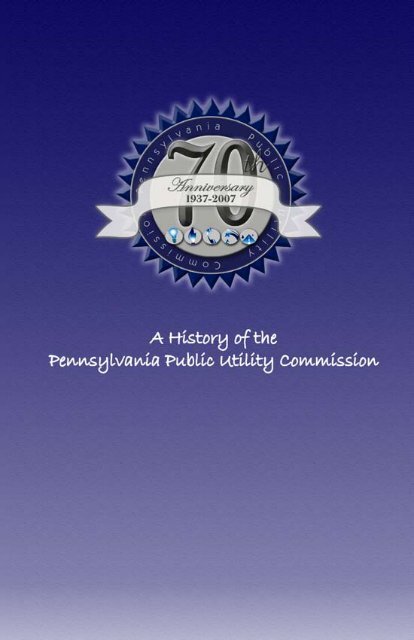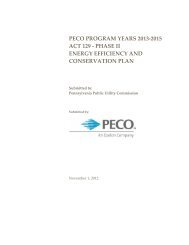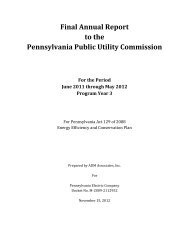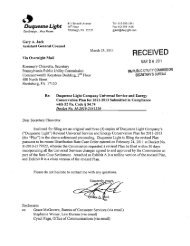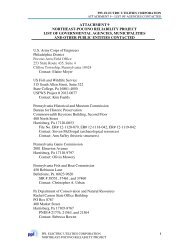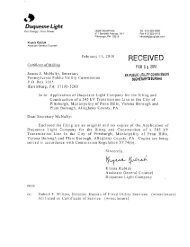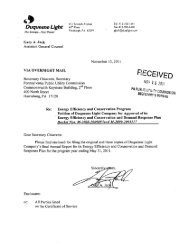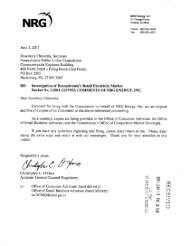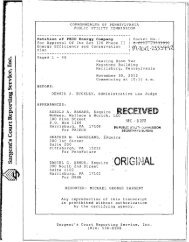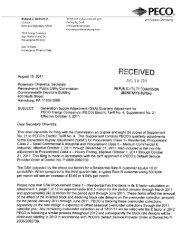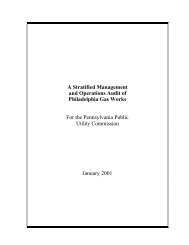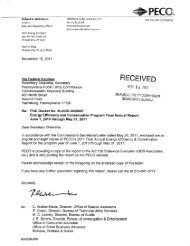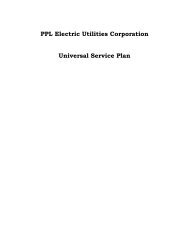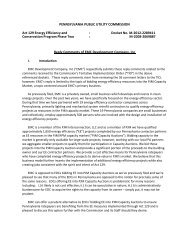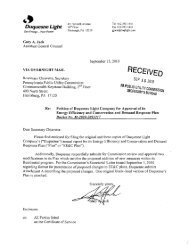The PUC's History - Pennsylvania Public Utility Commission
The PUC's History - Pennsylvania Public Utility Commission
The PUC's History - Pennsylvania Public Utility Commission
Create successful ePaper yourself
Turn your PDF publications into a flip-book with our unique Google optimized e-Paper software.
<strong>The</strong> PUC Today<br />
<strong>The</strong> <strong>Pennsylvania</strong> <strong>Public</strong> <strong>Utility</strong> <strong>Commission</strong> balances the<br />
needs of consumers and utilities to ensure safe and reliable utility<br />
service at reasonable rates; protect the public interest; educate<br />
consumers to make independent and informed utility choices;<br />
further economic development; and foster new technologies and<br />
competitive markets in an environmentally sound manner.<br />
<strong>The</strong> roles and responsibilities of the <strong>Pennsylvania</strong> <strong>Public</strong><br />
<strong>Utility</strong> <strong>Commission</strong> have continued to evolve over the years<br />
as legislators amended the <strong>Public</strong> <strong>Utility</strong> Code, and as the<br />
utility marketplace and technology evolved. <strong>The</strong> <strong>Commission</strong><br />
now regulates approximately 6,000 electric, natural gas,<br />
telecommunications, water/wastewater and transportation utilities.
• <strong>The</strong> PUC regulates electric distribution rates,<br />
ensures service reliability and fosters the<br />
development of competitive electricity markets.<br />
<strong>The</strong> PUC also participates in matters that impact<br />
the wholesale energy market.<br />
• Working to ensure safety, the PUC inspects the<br />
state’s more than 40,000 miles of natural gas<br />
pipelines, regulates natural gas distribution<br />
company rates and service, investigates gas<br />
cost rates, and encourages the development of<br />
competitive supply markets.<br />
• In promoting a competitive telecommunications<br />
market, the PUC works to ensure reasonable<br />
local rates and service quality, accelerate the<br />
deployment of high-speed Internet service, and<br />
make programs available so that no consumer is<br />
left without access to local telephone service.<br />
• <strong>The</strong> PUC regulates motor carriers that transport<br />
property, passengers and household goods, and<br />
conducts motor vehicle, and railroad facility and<br />
track inspections.<br />
• <strong>The</strong> PUC regulates the rates and service of<br />
investor-owned water and wastewater companies,<br />
along with some municipal systems that serve<br />
customers outside their boundaries. Since viable<br />
water systems are essential to strong <strong>Pennsylvania</strong><br />
communities, rates must be set to reflect prudently<br />
incurred costs of providing service.
Five <strong>Commission</strong>ers are<br />
nominated by the Governor and<br />
confirmed by a majority of the<br />
Senate for staggered five-year<br />
terms. <strong>The</strong> PUC employs about<br />
500 in Harrisburg, Philadelphia,<br />
Pittsburgh, Scranton and Altoona.<br />
<strong>The</strong> <strong>Commission</strong> has evolved<br />
over the past 70 years, becoming more accessible to the public,<br />
and better able to balance the needs of both consumers and<br />
utilities.<br />
A Legacy of Balance<br />
In 1907, the <strong>Pennsylvania</strong> General Assembly created<br />
the <strong>Pennsylvania</strong> State Railroad<br />
<strong>Commission</strong>, the Commonwealth’s<br />
first public utility regulatory<br />
agency. It held jurisdiction over<br />
railroad, streetcar and telegraph<br />
corporations. <strong>The</strong> Railroad<br />
<strong>Commission</strong> was abolished and<br />
replaced in 1913 with the sevenmember<br />
<strong>Pennsylvania</strong> <strong>Public</strong> Service<br />
<strong>Commission</strong> (PSC), which was given Streetcars on Market Street in<br />
Philadelphia, September 1920.<br />
the authority to regulate all public<br />
utilities. <strong>The</strong> PSC became operational in 1914 and began the<br />
legacy of balancing the interests of public service companies and<br />
the welfare of the public.<br />
With Act 43 of 1937, the General Assembly replaced the<br />
<strong>Public</strong> Service <strong>Commission</strong> with the <strong>Public</strong> <strong>Utility</strong> <strong>Commission</strong>, to<br />
better “supervise and regulate” all public utilities doing business<br />
in the Commonwealth. <strong>The</strong> Act created the position of Secretary,<br />
which also existed in the PSC. Act 186 of 1937 created the <strong>Public</strong><br />
<strong>Utility</strong> Law to guide the actions of the new five-member <strong>Commission</strong>
with statutory authority, among other things, to control market entry<br />
and exit; to approve mergers and acquisitions; to establish just and<br />
reasonable rates; to maintain safe, adequate and reasonable service;<br />
to examine transactions between utilities and their affiliates; to register<br />
securities; to inspect records and facilities; to impose civil penalties;<br />
and to assess utilities for regulatory costs.<br />
In its early years, the PUC had to deal<br />
with rationing of power during World War II,<br />
and keep up with rapid population growth<br />
and the increasing need for utility service in<br />
rural and suburban areas after the war.<br />
In the decades that followed, the PUC<br />
dealt with the development of nuclear electricity generation;<br />
electric price escalation in the 1970s driven by federal legislation<br />
and inflation, which affected all materials used to build new plants;<br />
“stagflation” as well as inflation; federal wage<br />
and price controls in the early ‘70s that barred<br />
rate increases at a time of major construction;<br />
and the oil embargo.<br />
This evolving societal change led to<br />
organizational and regulatory changes at the PUC, and the evolution<br />
of the services provided to ratepayers.<br />
After a comprehensive legislative review of the <strong>Commission</strong>’s<br />
structure, procedures, rules and regulations, and a review of the <strong>Public</strong><br />
<strong>Utility</strong> Law, Acts 215 and 216 of 1976 made a number of changes:<br />
• Moving <strong>Commission</strong>ers from part-time to full-time<br />
positions and placing an emphasis on <strong>Commission</strong>ers’<br />
accountability to both the utilities and ratepayers.<br />
• Establishing that a majority of <strong>Commission</strong>ers now<br />
constituted a quorum, so that pending rate requests
and investigations were not delayed if vacancies<br />
existed.<br />
• Upgrading <strong>Commission</strong> staff through employment of<br />
engineers, statisticians, accountants, inspectors and<br />
other experts, and appropriate compensation for<br />
expert staff.<br />
• Creating the Law Bureau as a multi-functioning legal<br />
staff, as well as the Bureau of Conservation, Economics<br />
and Energy Planning (CEEP), and the Bureau of<br />
Consumer Services (BCS).<br />
• Forming the Office of Administrative Law Judge (OALJ)<br />
and beginning the process of ALJ public hearings and<br />
ALJs submitting initial decisions to the <strong>Commission</strong> as a<br />
foundation for final orders.<br />
• Creating a new Code of Ethics for <strong>Commission</strong>ers,<br />
Administrative Law Judges and employees, including<br />
a prohibition on ex parte communications on issues<br />
presently before the <strong>Commission</strong>.<br />
Act 116 of 1978 created the <strong>Public</strong> <strong>Utility</strong> Code as the<br />
primary source of the PUC’s power and authority.<br />
Act 234 of 1984 provided for management audits of electric,<br />
natural gas, telephone and water utilities, and use of independent<br />
consulting firms.<br />
With Act 114 of 1986, the General Assembly again<br />
made changes to the PUC, creating the Office of Trial Staff to<br />
represent the public interest in all electric, natural gas,<br />
telephone, water and other fixed utility rate cases.<br />
<strong>The</strong> General Assembly also created the Office of<br />
Special Assistants (OSA) to assist in preparation<br />
of <strong>Commission</strong> orders and other
advisory work, and established the position of Director of<br />
Operations, responsible for day-to-day administration of the<br />
<strong>Commission</strong>.<br />
In the past several decades, the PUC faced the following<br />
changes and challenges:<br />
• In 1976, the PUC formed the Bureau of Audits by<br />
transferring auditors from the state Office of Auditor<br />
General, and from the PUC rates and research staff.<br />
• In 1977, the <strong>Commission</strong> created the Consumer<br />
Advisory Council to advise the PUC on utility issues<br />
important to consumers.<br />
• <strong>The</strong> <strong>Commission</strong> began implementing cogeneration and<br />
small power production under the federal <strong>Public</strong> <strong>Utility</strong><br />
Regulatory Policies Act of 1978 (PURPA).<br />
• In 1979, the Three Mile Island<br />
(TMI) nuclear power plant<br />
experienced a partial reactor<br />
meltdown. <strong>The</strong> state House<br />
passed Resolution 55, resolving<br />
“that the <strong>Pennsylvania</strong> <strong>Public</strong><br />
<strong>Utility</strong> <strong>Commission</strong> take such<br />
action as may be necessary to<br />
prevent the shifting of the cost<br />
of the accident at Three Mile<br />
Island from those responsible to<br />
consumers or the taxpayers.”<br />
Media gathered on the<br />
visitor center lawn at<br />
Three Mile Island.<br />
• From 1979 to 1985, the <strong>Commission</strong> dealt with the<br />
aftermath of the TMI accident while facing large rate<br />
increase requests, soaring inflation, high interest rates<br />
and the electric utilities’ requests for a return on their<br />
investment in completed nuclear power plants.
<strong>The</strong> 2007 <strong>Public</strong> <strong>Utility</strong> <strong>Commission</strong>: (front row left to<br />
right) Chairman Wendell F. Holland, <strong>Commission</strong>er Kim<br />
Pizzingrilli, Vice Chairman James H. Cawley and (back<br />
row) <strong>Commission</strong>er Tyrone J. Christy.
<strong>Commission</strong>er James H. Cawley, <strong>Commission</strong>er<br />
Susan M. Shanaman, Chairman W. Wilson<br />
Goode, <strong>Commission</strong>er Linda C. Taliaferro and<br />
<strong>Commission</strong>er Michael Johnson.<br />
<strong>Commission</strong>er Wendell F. Holland, Chairman<br />
David W. Rolka and <strong>Commission</strong>er Joseph Rhodes Jr.
<strong>Commission</strong>er Lisa Crutchfield, Vice Chairman Joseph Rhodes<br />
Jr., Chairman David W. Rolka, <strong>Commission</strong>er John M. Quain and<br />
<strong>Commission</strong>er John Hanger.<br />
<strong>Commission</strong>er David W. Rolka, Vice Chairman Robert<br />
K. Bloom, Chairman John M. Quain, <strong>Commission</strong>er John<br />
Hanger and <strong>Commission</strong>er Lisa Crutchfield.
<strong>Commission</strong>er Kim Pizzingrilli, Vice Chairman Robert<br />
K. Bloom, <strong>Commission</strong>er Glen R. Thomas, Chairman<br />
Terrance J. Fitzpatrick and <strong>Commission</strong>er Wendell F.<br />
Holland.<br />
Chairman Wendell F. Holland,<br />
<strong>Commission</strong>er Terrance J. Fitzpatrick,<br />
Vice Chairman James H. Cawley,<br />
<strong>Commission</strong>er Bill Shane and<br />
<strong>Commission</strong>er Kim Pizzingrilli.
• <strong>The</strong> <strong>Commission</strong> oversaw the associated<br />
cases and access charge proceedings<br />
needed to implement the federal<br />
breakup of AT&T in 1984.<br />
• In 1985, there was a major outbreak<br />
of giardiasis in the water supply<br />
affecting a half-million people in<br />
Northeastern <strong>Pennsylvania</strong>, which<br />
brought to light the need to filter<br />
all surface water sources to safeguard the<br />
population.<br />
• In 1985, the <strong>Commission</strong> on a case-by-case basis<br />
began to open up the natural<br />
gas industry to direct sales<br />
by producers to industrial<br />
customers.<br />
• In 1990, the PUC implemented the<br />
Telecommunications Relay Service, which allows<br />
people who are deaf, hard of hearing or speech<br />
disabled to communicate with anyone using a<br />
regular telephone. <strong>Pennsylvania</strong> was one of the first<br />
states to offer this service and acted prior to the<br />
passage of the federal Americans with Disabilities<br />
Act.<br />
• In 1993, the PUC conducted the <strong>Pennsylvania</strong><br />
Telecommunications Infrastructure Study that led to<br />
the original Chapter 30 and set out the first goals<br />
for providing broadband to all <strong>Pennsylvania</strong>ns.<br />
• In 1994, the PUC instituted<br />
a formal investigation and<br />
collaborative to examine
the structure, performance and role of retail<br />
competition in <strong>Pennsylvania</strong>’s electric utility<br />
industry. <strong>The</strong> <strong>Commission</strong> prepared the Report and<br />
Recommendation on Electric Competition, which<br />
helped to lead to the creation of the 1996 Electricity<br />
Generation Customer Choice and Competition Act.<br />
• <strong>The</strong> <strong>Commission</strong> created the Bureau of Fixed <strong>Utility</strong><br />
Services in 1995 with technical staff from OSA.<br />
• In 1995, the PUC<br />
combined the Bureau<br />
of Transportation and<br />
the Bureau of Safety<br />
and Compliance into the<br />
Bureau of Transportation<br />
& Safety.<br />
• Also in the midst of implementing changes to<br />
<strong>Pennsylvania</strong>’s utility marketplace, the PUC merged<br />
its public information personnel with BCS staff<br />
specializing in consumer education to create the<br />
Office of Communications. During this same period,<br />
the Office of Intergovernmental Affairs became the<br />
Office of Legislative Affairs. <strong>The</strong>se changes aimed<br />
at making the <strong>Commission</strong> more transparent and<br />
accessible to all ratepayers, and those who inform<br />
and represent consumers.<br />
• In 1997, the General Assembly enacted the<br />
Distribution System Improvement Charge (DSIC) to<br />
allow water companies to use a PUC-approved<br />
surcharge on customers’ bills to fund more upgrades<br />
of aging infrastructure than would otherwise be<br />
feasible at a reasonable rate for customers.
• In 1999, the PUC created the Bureau of<br />
Administrative Services to provide advisory support<br />
for administrative matters in the operation of the<br />
PUC.<br />
• In 1999, the Natural Gas Choice and Competition<br />
Act became law. As part of its implementation,<br />
the <strong>Commission</strong> continues to work with the General<br />
Assembly to find ways to foster natural gas and<br />
electric supply competition in <strong>Pennsylvania</strong>.<br />
• <strong>The</strong> PUC joined other state and federal agencies<br />
in preparing for “Y2K,” and the computer’s ability<br />
to make the calendar transition<br />
from Dec. 20, 1999, to Jan.<br />
1, 2000. This led to greater<br />
interaction between the<br />
<strong>Commission</strong> and the <strong>Pennsylvania</strong><br />
Emergency Management Agency<br />
(PEMA) during emergencies<br />
and power outages. This interaction benefited the<br />
Commonwealth in the aftermath of the terrorist<br />
attacks on Sept. 11, 2001, when the PUC worked<br />
with PEMA to determine utility vulnerabilities. <strong>The</strong><br />
state House of Representatives issued Resolution<br />
361 tasking the PUC and PEMA with reviewing,<br />
analyzing, and evaluating utility infrastructure<br />
security and risk-mitigation policies.<br />
• In 2000, the PUC moved its offices from the<br />
Capitol Complex’s North Office Building to the<br />
new Commonwealth<br />
Keystone Building. <strong>The</strong><br />
<strong>Commission</strong>ers began<br />
holding <strong>Public</strong> Meetings<br />
in a new Hearing Room<br />
1 in the new building.
• In 2002, in the wake of the Enron collapse, the PUC<br />
reviewed current corporate governance controls<br />
and auditing practices of the 27 major <strong>Pennsylvania</strong><br />
utilities.<br />
• During late 2004, the General Assembly<br />
passed three major new<br />
comprehensive laws bringing<br />
significant changes and challenges to<br />
PUC. <strong>The</strong> acts represented sweeping<br />
changes to the way energy and water<br />
utilities terminate consumers (Act 201 of<br />
2004); the way electric utilities and their<br />
consumers embrace the use of alternative<br />
energy sources for generation (Act 213 of<br />
2004); and the way telephone companies<br />
are regulated and deploy high-speed Internet<br />
services across <strong>Pennsylvania</strong>, through a new Chapter<br />
30 (Act 183 of 2004).<br />
• In 2007, the General Assembly again reviewed<br />
the <strong>Commission</strong>, through a performance audit by<br />
the Legislative Budget and Finance Committee,<br />
which found, among other things, that the PUC<br />
has made “significant regulatory changes” to<br />
maintain electric reliability; has ensured at least<br />
58 percent of <strong>Pennsylvania</strong> telephone access<br />
lines were broadband capable as of 2004,<br />
substantially ahead of the aggregate goal of 45<br />
percent to be compliant with Chapter 30; has made<br />
“good progress” in implementing the Alternative<br />
Energy Portfolio Standards Act; and is successfully<br />
partnering with the State Police to handle the Motor<br />
Carrier Safety Enforcement Program.
• Throughout the <strong>Commission</strong>’s history, technology<br />
advancements have led to increased effectiveness<br />
and efficiencies, such as a new online service that<br />
electronically processes insurance filings for<br />
commercial trucks, buses, taxicabs and limos, and<br />
the new Information Management & Access Project<br />
(InfoMAP), which will overhaul the PUC’s existing<br />
case management system to improve electronic<br />
workflow capability.<br />
<strong>The</strong> <strong>Commission</strong> is poised to meet the challenges of the next<br />
70 years and will certainly continue to evolve to meet the everchanging<br />
needs of <strong>Pennsylvania</strong> utilities and their customers.


